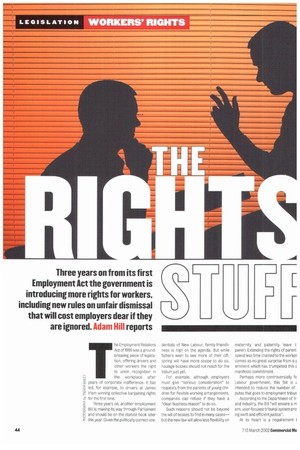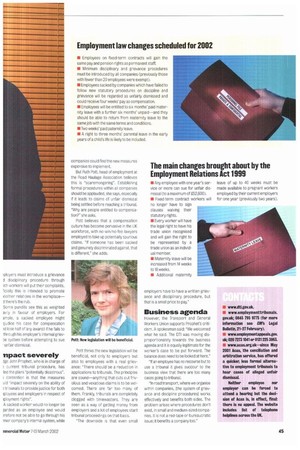Three years on from its first Employment Act the government
Page 44

Page 45

If you've noticed an error in this article please click here to report it so we can fix it.
is introducing more rights for workers, including new rules on unfair dismissal that will cost employers dear if they are ignored. Adam Hill reports
he Employment Relations Act of 1999 was a groundbreaking piece of legislation, offering drivers and other workers the right to union recognition in the workplace after g years of corporate indifference. It has § led, for example, to drivers at James Irlam viinning collective bargaining rights for the first time.
Three years on, another employment BiJI is making its way through Parliament and should be an the statute book later 0 F.. this year. Given the politically correct cre
dentials of New Labour, family-friendliness is high On the agenda. But whlie fathers keen to see more of their offspring will have more scope to do so, haulage bosses should not reach for the Valium just yet.
For example, although employers must give "serious consideration" to requests from the parents of young children for flexible working arrangements, companies can refuse if they have a "clear business reason' to do so.
Such reasons should not be beyond the wit Of bosses to find in many cases— but the new law will allow less flexibility on maternity and paternity leave ( panel). Extending the rights of parent spend less time chained to the workpl comes as no great surprise from a ernment which has trumpeted this manifesto commitment.
Perhaps more controversially fa Labour government, this Bill is intended to reduce the number of putes that goes to employment tribun According to the Department of Tr and Industry, the Bill will ensure am ern, user-focused tribunal system pro ing swift and efficient justice".
At its heart is a requirement 1 players must introduce a grievance disciplinary procedure through ich workers will put their complaints. Icially this is intended to promote loather relations in the workplace— there's the rub.
Some pundits see this as weighted avily in favour of employers. For em ple, a sacked employee might .ijudice his case for compensation vd lose half of any award) if he fails to through his employer's internal grievse system before attempting to sue :unfair dismissal.
npact severely
gc John Prophet, who is in charge of I current tribunal procedure, has lied the plans "potentially disastrous". ; contention is that the measures old "impact severely on the ability of tribunals to provide justice for both ipioyees and employers in respect of ipleyment rights".
A sacked worker would no longer be gaited as an employee and would refore not be able to go through his :mer company's internal system, while companies could find the new measures expensive to implement.
But Ruth Pott. head of employment at the Road Haulage Association believes this is "scaremongering". Establishing formal procedures within all companies should be applauded, she says, especially if it leads to claims of unfair dismissal being settled before reaching a tribunal "Why are people entitled to compensation?" she asks.
Putt believes that a compensation culture has become pervasive in the UK workforce, with no-win/no-fee lawyers employed to take up potentially spurious claims. "If someone has been sacked and genuinely discriminated against, that is different," she adds.
Pott thinks the new legislation will be beneficial, not only to employers but also to employees with a real grievance: ''There should be a reduction in applications to tribunals. The principles are sound—anything that cuts out frivolous and vexatious claims is to be welcomed. There are far too many of them. Frankly, tribunals are completely clogged with timewasters. They are seen as a way of getting money from employers and a lot of employees start tribunal proceedings on that basis.
"The downside is that even small employers have to have a written grievance and disciplinary procedure, but that is a small price to pay"
Business agenda
However, the Transport and General Workers Union supports Prophet's criticism. A spokesman said: "We welcomed what he said. The DTI was moving disproportionately towards the business agenda and it is equally legitimate for the worker's case to be put forward. The balance does need to be looked at here.'
Tan employee has no recourse but to use a tribunal it gives succour to the business view that there are too many cases going to tribunal.
"In road transport, where we organise within companies, [the system of grievance and discipline procedures] works effectively and benefits both sides. The problem arises where procedures don't exist, in small and medium-sized companies. It is not a red-tape or bureaucratic issue; it benefits a company too."
























































































































































